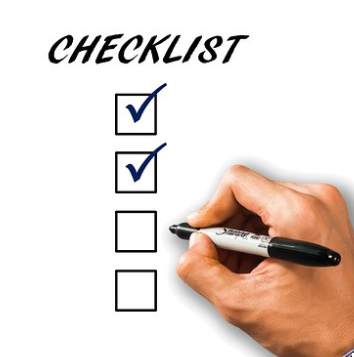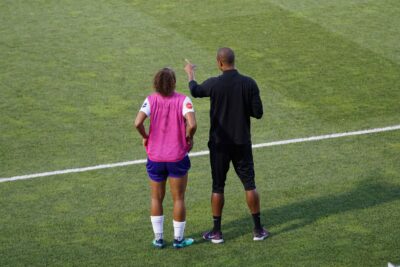Are you a soccer coach hoping to sharpen your observation skills?

Discover tried-and-true methods that will undoubtedly assist you in determining each player’s skills, potential, and areas for development.
Learn how to control the game while observing, make modifications, and more. Soccer coaches must have an eye for detail because the sport is fast-paced and always changing.
As a result, the ability to observe is crucial for soccer coaches to accurately analyse their players’ performances and make quick modifications.
It may take some time to master this ability. Even so, there are tried-and-true methods that can help any coach sharpen their observational skills and raise the bar for their squad.
In this blog post, we will look at some of these tactics so you too can add them to your coaching arsenal today!

Creating An Observational Checklist
By making an observational checklist before each game or practice, you may hone your observational abilities as a coach.
Formations employed during play, circumstances leading to goals scored, defensive positioning and decision-making during set piece defence, passing accuracy between teammates, levels of communication during the game, etc. should all be included on this list.
Writing down these vital things beforehand enables you to concentrate entirely on them during games rather than trying to keep up with everything that is going on around you simultaneously, which could lead to confusion or distraction from other crucial information occurring on the pitch side.
Additionally, using checklists assists in post-game analysis by clearly identifying specific individual performance areas that, if necessary, need to be improved. This helps the team’s performance overall improvement over time.
Make notes alongside your checklist: Taking notes is a powerful tool for enhancing your ability to observe. Writing down a few important elements or providing a more thorough description of what you are seeing could suffice.
Organising and processing the material you are learning by taking notes might help you recall and understand it better.
Utilising video analysis technology

Video analysis is a powerful tool for soccer coaches because it allows coaches to slow down the action and study details that you would miss in real-time.
Use video analysis to observe certain abilities or methods, like passing or tackling, and take notes on what you see. A drone is a fantastic tool for filming from an aerial perspective. Read my article Football and Drones – the ultimate guide
Soccer coaches can learn a great deal about how teams handled pressure and specifics about individual mistakes made (or not).
It is crucial to learn how to use video software products like Hudl Sportscode Elite and Nacsport Scout Plus if you are fortunate enough to work for a professional soccer team or even a good-level semi-pro club.
This information gives those in charge more authority when evaluating potential opponents ahead of upcoming games, improving overall preparation and performance on the field.
Working closely with professional scouts/analysts
Many football coaches at the elite level use this fantastic approach. Prior to significant events like the UEFA Champions League Finals, these people are experts in researching the opposition teams.
They typically have extensive databases with information on every aspect of the opposition’s style of play, from formation selections all the way up to particular tactical strategies used in previous matches against the stated club.
This makes it possible to make informed judgements on individuals and line-ups, as well as the general strategy required to defeat the opposition come kick-off day. This eventually leads to success and the desired outcome!
Furthermore, when looking objectively at diverse scenarios, other experts bring a fresh perspective, even ones that may have been neglected initially owing to a lack of experience with unfamiliar playing styles encountered previously.
This creates space for fresh perspectives that might increase the likelihood of winning games away from home when it has historically been difficult to do so.
Involving players in the observation process
Another practical tactic open to modern soccer managers is player involvement.
Specifically, including squad members in one-on-one or group discussions about how they feel about their own performances.
When the circumstance arises, this should be done based on preference, and constructive criticism should be provided in a suitable manner without fear of retribution.
Sensitive topics can be openly addressed among peers, leading to a greater understanding of a far wider range of subjects than what traditional techniques alone would provide. as in this case!
This not only gives everyone the chance to freely express their opinions and to exchange views and thoughts from different angles, but it also fosters a sense of collective ownership throughout the entire team, inspiring them to work even harder to accomplish a common objective.
This makes it simpler to identify individuals’ and teams’ limitations and strengths so that adjustments can be made in a way that will ultimately benefit the entire group as it moves forward with whatever challenge lies ahead for the upcoming season and beyond.
Conclusion
Although it takes practice to become a good observer, using the few straightforward strategies listed above will guarantee that the coach gets the most out of watching practises while gaining insightful knowledge to help shape the team and prepare them for the battles that lie ahead on the road to victory – keeping their ultimate goal in mind, of course.
from making checklists and analysing footage of player conversations to getting outside counsel from scouting experts.
Increasing awareness of events occurring in front of one’s eyes leads to sharper judgement calls, taking advantage of opportunities offered as they arise, regardless of the form or opponents hurled in the opposite way.
By following these ideas and practising on a regular basis, you may enhance your observation abilities as a football coach and make better-informed decisions about how to develop your players and increase team performance.
Results will soon start to appear, demonstrating that the effort put out was actually beneficial.
If you enjoyed this article and have any questions or comments or just wish to share your thoughts.
Please leave them in the comments box and I will respond once I get the chance.



